
Blog: Granted Dignity and Humanity: Experience of Palliative Care in Gaza
![]() Hannah Ikong
Hannah Ikong
![]() 14th June 2023
14th June 2023
In the last year, Cairdeas IPCT has partnered with the Islamic University of Gaza (IUG) and the Turkish-Palestinian Friendship Hospital (TPFH) to create a palliative care professional diploma programme. Together, with the support of the University of Edinburgh and Palliative Care in Humanitarian Aid Situations and Emergencies (PallCHASE), the students have covered six modules of instruction with visiting faculty, as well as clinical instruction and fortnightly, virtual teaching sessions.
Our Medical Director, Dr Mhoira Leng, alongside Dr Khamis Elessi the Gaza lead, have been mentoring and supporting the TPFH to develop and implement a palliative care clinical programme.
The next international faculty visits will be in August 2023, and we wanted to hear from some of the students for their key observations, feedback, and experiences. We asked members of the TPFH palliative care team who are also students on the Diploma.
One student, Suha S. Shaa’th, a senior pharmacist who is also the lead for opiate procurement, shared several reflections on palliative care. She explained “the importance of letting patients live in dignity and die in peace,” while adding that “palliative care reinforces the sense of humanity and improve the concept of compassion and empathy, that means we do not deal with patients as numbers.” Suha highlighted her skills gained through the diploma programme, such as communication, working in multidisciplinary teams and evidence-based practice.
A physician specialising in pain and palliative care management at TPFH, Amjad F. Eleiwa, spoke about the knowledge gained from the programme, saying, “I started to deal with the patient not only as someone in pain, but also as a whole person.” Amjad then shared a patient story to illustrate holistic care:
"A few weeks back, I had a 26-year-old patient who was diagnosed to have Ewing sarcoma. The patient started his management in Jordan then was referred back to Gaza after expiring all lines of treatment … The issue we faced is the shortage of controlled release oral morphine in Gaza and that is where the palliative care training came in. We started to look for available alternatives and gave him sub cutaneous injections of morphine and patches of fentanyl. His pain started to get under control."
"During our work with the patient, we noticed that he accepted his condition but not his mother. She was so close to him and she had a lot of questions like "why him?". We had our focus on the patient and on his mother to prepare her for the inevitable: his death."
"At the end, she was thankful that he died in peace with no pain and with great acceptance."
We will close with the comments from Basel M. Ashour, a psychologist and student in the diploma programme. Basel noted that “psychological pain is considered one of the most aggressive pain among cancer patients” then discussed how “palliative care added to my experience how to know other team’s knowledge … about nutrition, pain management, physiotherapy, etc.”
He concluded: “Many people just need us to spend time with them, to communicate well, to be dealt with extra respect and be granted dignity and humanity.”
We will share more of the experiences of students and faculty in the future. We thank all the students in diploma programme for their implantation of compassionate palliative care; may we all continue to uphold dignity and humanity.
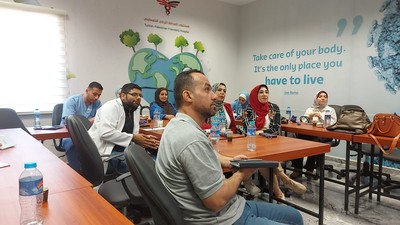
Students gather to watch the virtual presentation during a teaching session.
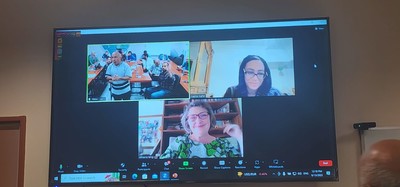
In this teaching session, Dr Khamis Elessi is in person, while Dr Mhoira Leng and Dr Nahla Gafer connect over Zoom.
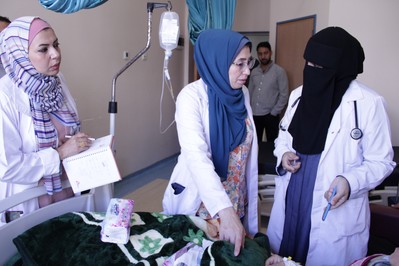
Suha S. Shaa’th, Mervat Abdelkarim Hammad and Nour M Almasry during a ward round as they discuss the patient.
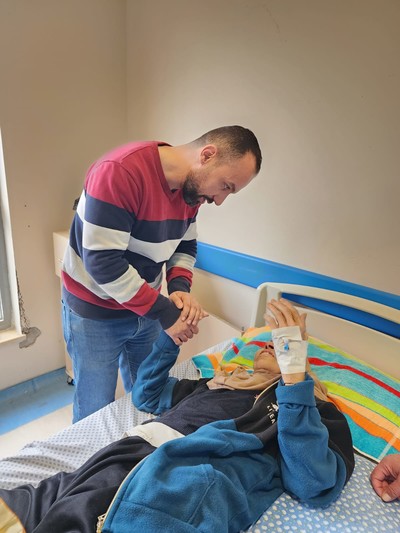
Psychologist Basel M Ashour with a patient on a ward round.
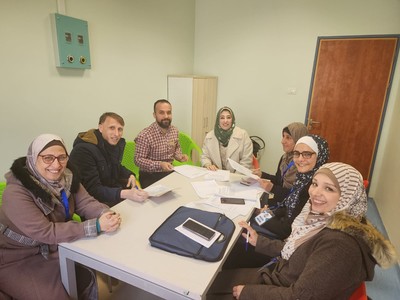
Multidisciplinary team work among students and their colleagues.
